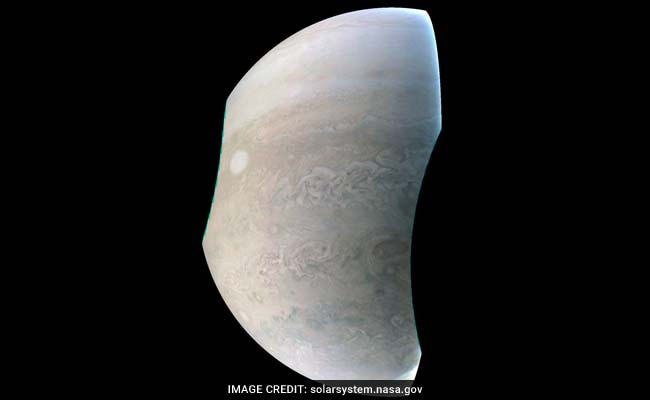
NASA's Juno spacecraft captured the seventh of eight features forming a 'string of pearls'.
Washington:
In its latest close flyby of Jupiter, NASA's Juno spacecraft captured the seventh of eight features forming a 'string of pearls', massive counterclockwise rotating storms that appear as white ovals in the gas giant's southern hemisphere, the US space agency said on Wednesday.
The image was taken by the JunoCam imager on December 11 as the Juno spacecraft performed its third close flyby of Jupiter, NASA said.
At the time the image was taken, the spacecraft was about 24,600 kilometres from the planet.
JunoCam is a colour, visible-light camera designed to capture remarkable pictures of Jupiter's poles and cloud tops.
As Juno's eyes, it will provide a wide view, helping to provide context for the spacecraft's other instruments.
The Juno spacecraft launched on August 5, 2011, from Cape Canaveral, Florida, and arrived at Jupiter on July 4, 2016.
During its close flybys, Juno will probe beneath the obscuring cloud cover of Jupiter and study its auroras to learn more about the planet's origins, structure, atmosphere and magnetosphere.
The image was taken by the JunoCam imager on December 11 as the Juno spacecraft performed its third close flyby of Jupiter, NASA said.
At the time the image was taken, the spacecraft was about 24,600 kilometres from the planet.
JunoCam is a colour, visible-light camera designed to capture remarkable pictures of Jupiter's poles and cloud tops.
As Juno's eyes, it will provide a wide view, helping to provide context for the spacecraft's other instruments.
The Juno spacecraft launched on August 5, 2011, from Cape Canaveral, Florida, and arrived at Jupiter on July 4, 2016.
During its close flybys, Juno will probe beneath the obscuring cloud cover of Jupiter and study its auroras to learn more about the planet's origins, structure, atmosphere and magnetosphere.
Track Latest News Live on NDTV.com and get news updates from India and around the world

